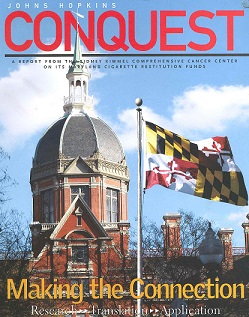 This blog is part 2 of 4 of our “Cancer-Free Mondays” series about how the Maryland Cigarette Restitution Fund is helping Maryland Citizens.
This blog is part 2 of 4 of our “Cancer-Free Mondays” series about how the Maryland Cigarette Restitution Fund is helping Maryland Citizens.
This year marks the 50th anniversary of the landmark report by the U.S. Surgeon General that linked smoking with cancer and other diseases. Prior to the Surgeon General’s report, it is estimated that 42 percent of Americans smoked. In the years that followed the report—which for the first time made public the dangers of smoking—U.S. smoking rates declined and are now 18 percent. Experts calculate that this decline in smoking translates to some 8 million lives saved.
The same smoking-related health dangers that prompted the 1964 Surgeon General’s report were at issue in the 1990s class action law suit that resulted in the creation of the Maryland Cigarette Restitution Fund (CRF). It seems fitting then, on this historic anniversary, to take a look at how Maryland’s public officials have tackled smoking and how the CRF has made a difference.
In fact, Maryland is doing better than the U.S. as a whole. At 14.9 percent, Maryland smoking rates among adults are below the national average and are one of the lowest in the nation. Elected officials and researchers have worked particularly hard to protect Maryland’s youngest citizens, and that has been one of our state’s greatest success stories. The youth (age 12-17) smoking rate in Maryland is 8 percent, well below the national average of 14 percent.
These positive smoking trends did not occur by chance. They are the result of a dedicated and informed effort by Maryland’s elected officials in conjunction with CRF investigators. Backed by the results of CRF research, Maryland lawmakers made significant policy changes. They increased taxes on cigarettes and instituted tough regulations on smoking, such as the Clean Air Act. Our state has enacted some of the nation’s strictest smoking policies, and theses changes have led to declines in Maryland smoking rates, and most importantly, saved lives.
CRF supported research at Johns Hopkins is helping guide policy and improve smoking cessation strategies. Since 2001, 15 CRF grants have been awarded to Johns Hopkins scientists to develop strategies to help people quit smoking, to study the best ways to communicate the dangers of smoking to teens and young adults, and for in-depth research of the science of smoking and cancer.
CRF investigators at Johns Hopkins have:
- uncovered the genetic mutation that provided the definitive scientific proof that smoking causes cancer.
- studied the combined effect of firsthand and secondhand smoke on cancer incidence.
- constructed a cigarette smoke facility and deciphered the specific genetic mechanisms corrupted by cigarette smoke and at play in the development of smoking-related cancers.
- assessed Maryland’s smoking prevention strategies to determine what works and what does not.
- completed a comprehensive analysis of smoking-related gene mutations in GI cancer.
- conducted research to establish evidence-based antismoking strategies for youth.
- engaged in a partnership with Howard University for community-based research to better understand the factors that influence tobacco use among 18-24 year old African Americans.
Although our state’s leaders and scientists have again positioned Maryland as a trailblazer in addressing the dangers of cigarette smoke, they also recognize that there is still work to be done. About one half million Marylanders continue to smoke. Smoking remains the leading risk factor for cancer. The National Cancer Institute reports that smoking is a cause of cancers of the lung, esophagus, voice box (larynx), mouth, throat, kidney, bladder, pancreas, stomach, and cervix, and acute myeloid leukemia. Even for those who have developed cancer, smoking only makes it worse. Research shows that people with cancer who continue to smoke increase their risks of developing second cancers, do not respond as well to cancer treatments, and are at higher risk than nonsmokers of dying of other chronic diseases, such as heart disease.
The message is simple. If you don’t smoke, don’t start. If you smoke, quit.
WHERE TO GET HELP TO QUIT SMOKING:
Call the Maryland Quit Line 1-800-QUITNOW
Talk to your doctor. Under the Affordable Care Act, tobacco users may be eligible for free tobacco cessation interventions.
SmokeFree.gov provides information about methods and medications that make it easier to quit.
Part 1: Maryland and Johns Hopkins – A Partnership that Works for Maryland Citizens